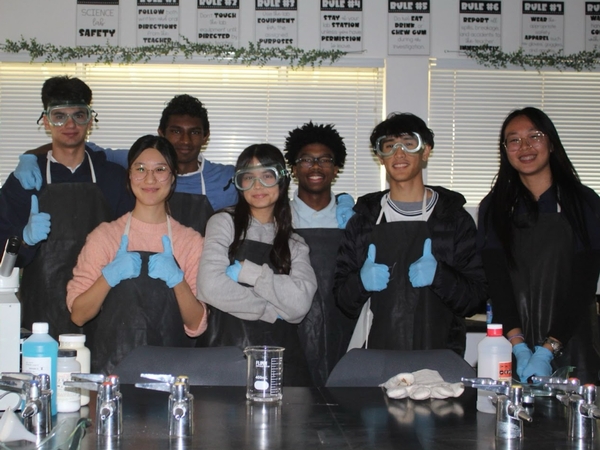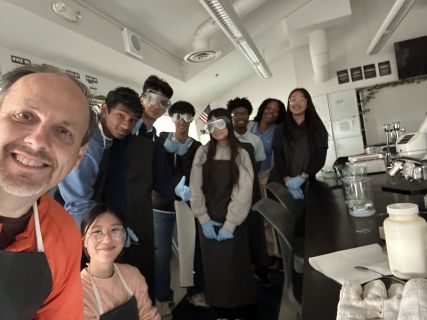
Beats, Brains & Balance: Our New Science Club Does A Deep Dive into Music and Stress on Campus

There's a new buzz on campus, and it's not just the sounds of the end of the year! Our brand-new Science Club officially launched this year, and they're already making (sound) waves with their inaugural research project: an investigation into the effects of music on stress levels among students and faculty.

The idea for the Science Club sprang from a shared passion for discovery and a desire to foster a community around scientific inquiry. "I wanted to start the science club to do experiments and research projects and have a community to talk about science with," says Khaveen, one of the driving forces behind the club's creation. "I also started it to supplement my curiosity about some scientific questions, like stress and music." Other members echoed this sentiment, highlighting the lack of an official science club at RAA and the appeal of a new extracurricular. "I also just like learning and studying about new things," shared one enthusiastic member, while another added, "I joined out of curiosity because it was a science group for students who are interested in and planning to go into the medical field." The club quickly became a space for growth, cooperation, and even some unexpected fun. "Originally I joined to support Khaveen in his strive to start a club," a member admitted, "but after joining I soon learned that it was actually an enjoyable time. There have been many laughs, states of confusion, and fun memories all together; I don't regret joining."
So, why stress? It's a universal experience, especially for high school students. "Everyone, including me, experiences it, and experiencing such stress is detrimental to our mental health," explained a club member. "So, the club and I wanted to help our community by studying how to help with stress." The idea resonated deeply with the team. "Stress is something that everyone experiences every day," another member pointed out. "I wanted to know how stress is affected by different subjects." From academic pressures to extracurricular demands, stress is a constant in the lives of RAA students. "It's a very big force in our everyday life," said one student. "Especially in high school, there are a lot of activities and work, and it can cause you to be very stressed. So learning about it in a different way, like through music, can help you get through that stress and also learn about the stress."
The club's ambitious study aimed to provide tangible ways to combat this pervasive issue. "We hope to educate more people about stress and to help people lower it in their everyday lives," stated a hopeful member. The team set out to investigate how music, specifically, impacts stress levels, using heart rate as a key indicator. To do this, they put students in a controlled environment, had them work on challenging riddles, and measured their heart rates several times. They also sent out surveys to high school students and teachers to gather broader insights into stress and its effects. "I and the rest of the team want to accomplish how music affects stress levels through your heart rate. Not only looking at freshmen through seniors, but also teachers," a student elaborated. The ultimate goal: to find "simple ways to combat stress in our daily lives as high schoolers."
Their initial hypothesis was that "listening to our favorite relaxing music will have the most significant impact on reducing levels of stress." The results were intriguing, offering both validation and new questions. "Our initial hypothesis... was kind of proven but also disproved because the people with higher heart rates had no effect from the music," explained one researcher. "We learned that listening to music will lower stress for the more relaxed individuals in a short period of time (10 mins)." Interestingly, the study also revealed that "music that people personally enjoy was actually more helpful in calming them down" than classical music, a finding that challenged their initial expectations. One member noted, "This project helped me gain useful knowledge about ways to reduce stress. For example, we found that listening to good music can help relieve stress, which made me decide to build a habit of listening to more good music."
To gather their data, the club designed a clever experiment. "We recruited one male and one female high school student from each grade at RAA, along with two faculty members (one male and one female) who were interested in participating," their study summary outlined. "Each participant would engage in a challenging problem-solving activity with a short time limit to induce stress." Following this stress-inducing task, participants would listen to either their favorite song or a classical piece for ten minutes, with their heart rates diligently monitored using pulse oximeters. "We gathered our data by collecting students and teachers and doing riddles on them with a time limit playing in front of them," described a member. "They would then listen to either classical music (Mozart) or their favorite stress reliever songs. We would use multiple heart rate monitors to find the average heart rate every 2 minutes for 10 minutes."
While the process was enlightening, it wasn't without its challenges. "My favorite part was seeing our hypothesis proven," one member shared, while another found enjoyment in "seeing people's answers on the riddles and also trying it out for myself." However, "the most challenging part was to make sure that nothing we do affects the data and raises their BPM." Technical difficulties with pulse oximeters also added to the complexity. Despite these hurdles, the club found joy in the collaborative nature of the work. "It was fun talking about science and doing experiments with my friends," a student happily recounted.
The Science Club isn't stopping here. They have ambitious plans to enter their research into the San Bernardino Inyo Mono Science Fair. "We want to try to enter the San Bernardino Inyo Mono Science fair to give a more public view to our findings," a member enthusiastically shared. This opportunity is seen as a major stepping stone. "To be able to enter the San Bernardino science fair would be a huge opportunity, especially for such a small school like us," said a student. "We would not only be able to share our findings on our research, but also be able to see other schools that are much bigger than us and see what they are researching and finding out." Beyond the competition, the club hopes to expand, gain more members, and leave a lasting legacy at RAA. "We hope to gain more members and make it more structured and hopefully leave a lasting legacy that will continue for years to come," shared a forward-thinking member.
The new Science Club is off to an incredible start, demonstrating curiosity, dedication, and a commitment to understanding and improving the well-being of their school community. A special thanks is extended to "everybody that participated in the study, whether as a member, as a sponsor, or as a participant, because without them this study would not have been possible." It's clear that this club is not just about experiments; it's about building a community, fostering a love for learning, and making a real-world impact.